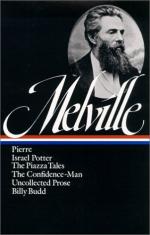WHICH HAS SOMETHING TO SAY ABOUT DR. FRANKLIN AND THE LATIN QUARTER.
The first, both in point of time and merit, of American envoys was famous not less for the pastoral simplicity of his manners than for the politic grace of his mind. Viewed from a certain point, there was a touch of primeval orientalness in Benjamin Franklin. Neither is there wanting something like his Scriptural parallel. The history of the patriarch Jacob is interesting not less from the unselfish devotion which we are bound to ascribe to him, than from the deep worldly wisdom and polished Italian tact, gleaming under an air of Arcadian unaffectedness. The diplomatist and the shepherd are blended; a union not without warrant; the apostolic serpent and dove. A tanned Machiavelli in tents.
Doubtless, too, notwithstanding his eminence as lord of the moving manor, Jacob’s raiment was of homespun; the economic envoy’s plain coat and hose, who has not heard of?
Franklin all over is of a piece. He dressed his person as his periods; neat, trim, nothing superfluous, nothing deficient. In some of his works his style is only surpassed by the unimprovable sentences of Hobbes of Malmsbury, the paragon of perspicuity. The mental habits of Hobbes and Franklin in several points, especially in one of some moment, assimilated. Indeed, making due allowance for soil and era, history presents few trios more akin, upon the whole, than Jacob, Hobbes, and Franklin; three labyrinth-minded, but plain-spoken Broadbrims, at once politicians and philosophers; keen observers of the main chance; prudent courtiers; practical magians in linsey-woolsey.
In keeping with his general habitudes, Doctor Franklin while at the French Court did not reside in the aristocratical faubourgs. He deemed his worsted hose and scientific tastes more adapted in a domestic way to the other side of the Seine, where the Latin Quarter, at once the haunt of erudition and economy, seemed peculiarly to invite the philosophical Poor Richard to its venerable retreats. Here, of gray, chilly, drizzly November mornings, in the dark-stoned quadrangle of the time-honored Sorbonne, walked the lean and slippered metaphysician,—oblivious for the moment that his sublime thoughts and tattered wardrobe were famous throughout Europe,—meditating on the theme of his next lecture; at the same time, in the well-worn chambers overhead, some clayey-visaged chemist in ragged robe-de-chambre, and with a soiled green flap over his left eye, was hard at work stooping over retorts and crucibles, discovering new antipathies in acids, again risking strange explosions similar to that whereby he had already lost the use of one optic; while in the lofty lodging-houses of the neighboring streets, indigent young students from all parts of France, were ironing their shabby cocked hats, or inking the whity seams of their small-clothes, prior to a promenade with their pink-ribboned little grisettes in the Garden of the Luxembourg.




